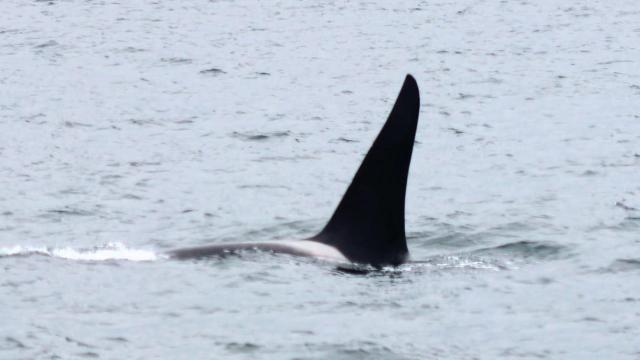If movies were scientifically accurate, here’s how Jaws would pan out: As the film’s signature theme begins to play, a black dorsal fin slinks around the water’s surface. Great white sharks flee in fear as the camera reveals the true menace: A killer whale.
Great white sharks and orcas overlap in their positions on the food chain — they can appear in the same places and feed on the same prey. But when they interact, even a short visit from an orca can send the massive sharks scurrying for long periods of time, according to a new paper published in Scientific Reports.
The ranges of the great white sharks and killer whales overlap in the Northern Pacific, especially during the autumn and early winter, when they both meet on coastal sites to prey on seals.
There hasn’t been a lot of study on the direct interactions between these two predators, though orcas do sometimes attack sharks, probably to feed on their nutrient-rich livers, as we’ve previously reported. Since there’s more to interspecies relationships than who eats whom, the researchers set out to find out how the animals interact in these shared spaces.
Researchers lured great white sharks to their boat with a “seal decoy made from outdoor carpet” and put electronic tags on 165 of them from 2006 to 2013 at three coastal California locations: Southeast Farallon Island, Tomales Point and Año Nuevo Island.
They then gathered data from various shark, killer whale and elephant seal monitoring surveys at the Southeast Farallon Islands Their analysis revealed that the closer the orcas were to the islands, the fewer seals the sharks killed.
There were many examples of orcas spooking the sharks. On 2 November 2009, there were 17 tagged sharks in the waters around the islands. Killer whales showed up for just 2.5 hours and didn’t kill any of the tagged sharks — but the scientists stopped detecting all but one of those sharks in the waters for the rest of the season. Similar shark exoduses occurred in 2011 and 2013.
Though the study relies on estimates from survey data, it presents evidence that the great white sharks feeding around the Southeast Farallon Islands feared the visiting orcas.
That’s important, according to the paper, because it demonstrates a nuanced relationship between species that could have effects beyond just scaring the sharks off — it might impact the elephant seal populations, which would grow larger with fewer sharks around.
If you take away one thing from this study, it should be this: Sharks aren’t as scary as orcas. I propose some director remake both Jaws and Free Willy with this in mind.
